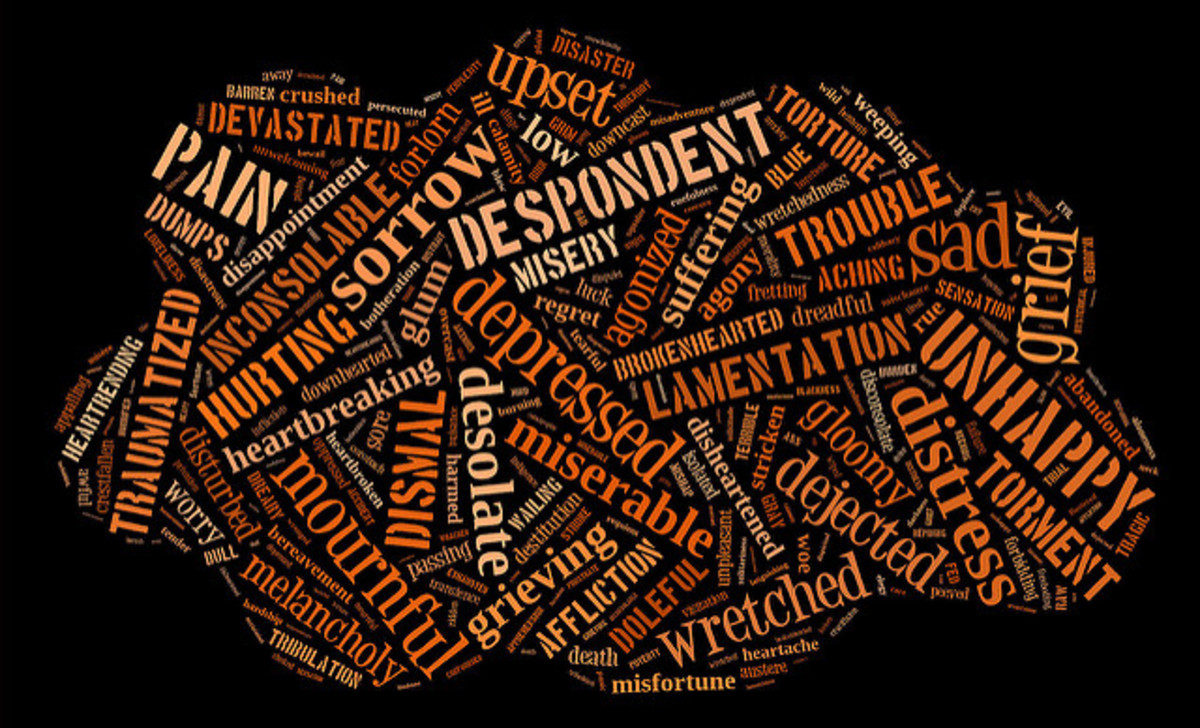I am no stranger to depression, and in the past I have suffered from varying degrees of it. It is a cunning old fox that can creep up on you without you realizing it and take a hold on you; well, that’s what most people would say! In reality, this often only happens the first time you become depressed, because of course you don’t understand what being depressed can do to you the first time around.
If you have ever been depressed before you know what it feels like, and you will likely recognize the signs that it may be returning. You also probably know why your first depression happened. Was it a reactionary depression? In a lot of cases it will have been, as you reacted negatively to a trauma, an old wound, family problems, the death of a loved one, money worries and so on.
Mild to moderate depression is very common and unless you have a mood disorder such as bipolar with a sudden decline in mood, you will find that depression deepens with time. The time for depression to become severe will vary from person to person, but usually it will take many weeks, sometimes months before a severe stage is reached.
You may simply be prone to get bouts of depression from time to time, almost as if it is part of your personality. People who have led lives that have been fraught with problems can get a domino effect in the cause of their depression.
The Domino Effect of Depression

Example: a person may have had a traumatic childhood, been hurt or abused in a bad relationship, suffered chronic health problems, accumulated debt, and not come to terms with the loss of a loved one. Each time a person suffers emotionally after such a string of negative events, if the previous stressors have not been adequately addressed, then a subsequent stressor will be felt tenfold!
This article will look at how we can control a mild to moderate depressive mood; what we can do to identify the first signs of a bout of depression and work on those signs to avoid severe depression.
Depression Can Make You More Tired

Identifying Signs of Depression
For those who have never had depression before, here is a list of common symptoms:
- Persistently feeling sad and hopeless
- Irritable and restless; increased anxiety
- Losing interest in usual activities, hobbies
- Tired or fatigued; sleep problems
- Weight loss or gain; eating much more or less than usual
- Disinterest in sex
- Vague aches and pains or worsening of a chronic physical health problem
- Plagued by feelings of guilt or worthlessness
- Lack of concentration
- Feeling withdrawn and not wanting to socialize
For those who have had depression before you will be able to identify with some, if not all, of those symptoms and probably be able to add some more!
Negative Emotions

If you look at the picture above, you will see that there is a vast array of negative feelings or emotions. How many of those emotions can you add to your other symptoms of depression? It is a good idea to make a list of all your negative emotions so that you can be aware of just how negative your thoughts are.
Causes of Depression
Negative Thinking and Depression
Depression is awash with negative thinking patterns. Most of this negativity will center on how a person perceives not only the cause but themselves. Feelings of guilt, of being victimized, worthless, useless, unloved, hopeless and ashamed, are all common feelings in depression.
You will probably have “mind chatter” or self-talk when you become depressed, and there are certain negative phrases that will crop up often such as:
- I can’t – as in “I can’t take this”
- I won’t – as in “I know I won’t be able to look after the children”
- I am a failure
- I hate myself
- Everything bad always happens to me (self pity/victimization)
- I don’t – as in “I don’t fit in”

Reasons for Depression
Some people will not know why they feel depressed whilst others will have an instant identifiable cause. It may be that some old long forgotten stress or trauma has simply been put on hold in the subconscious. It is more usual that the cause will be obvious, sometimes even typical such as bereavement.
It is true that depression may be initiated by memory. That memory may be of a past trauma that you would prefer to forget, but now and again you may be reminded of it. Maybe someone in your life reminds you of that memory, perhaps even a family member. It could be a place or an event that triggers this negative memory and forces you to feel a whole host of emotions. See if you can identify the cause or causes for your depression. Make a list of these also.
| Cause/Trigger | Emotions | Negative Self Talk |
|---|---|---|
| Broken relationships | Unloved, worthless, resentful, scared | I am unlovable, I won’t find anyone else, it’s all my fault |
| Death of a loved one | Scared, angry, helpless | I let that person down, I didn’t say goodbye, I can’t cope without him/her |
| Debts/money worries | Scared, anxious, guilty | I can’t get out of this, I am useless, I deserve this |
| Weight gain | Useless, self-hatred, guilty | I can’t stop eating, I hate myself, I am a failure,I am ugly |
When you can see exactly what is going on, you can try to control the depressive state.
If we could not think, we would not have these emotions! Our behavior and moods are all directly linked to the way we think, and the way we perceive both ourselves and the world. As we became adults, we have laid down many personal opinions about what is good/bad, and what is acceptable or unacceptable. Our personalities may have an effect on how we manage our lives, so what one person perceives as a failure, another might not. No two people are the same, but negative thinking is a trait that all depressives share.
How to Control Feelings
Given that you can accept how thoughts directly affect your feelings or emotions, it makes sense to change the way you think. This may seem impossible to some, and to those who have become severely depressed, it may well be the case.
Remember two things:
- You can’t think about two things at the same time – try it and you will see that you will only ever be actually thinking about one thing at any one time
- It is difficult to hold on to two opposing thoughts at the same time – you will only ever be thinking a positive or a negative thought at one time and will never be able to think positively and negatively at exactly the same time
Now you should look at your negative self talk phrasing. You must change the way you think by using positive self-talk. When depressed you believe the negative self talk, but by replacing negative with positive, eventually you will believe that also. At first it may not seem to be working, but if you stick at it and see the rationality of the change it will work eventually. Thinking positively will reverse a negative mood. You need to make it your second nature to recognize a negative thought as it arises and change it in a positive way. (There are some examples below).
It helps if you keep a little notebook listing negative thoughts and positive alternatives. Read these at your leisure, but scan over some at least once every day until you feel you have become used to knowing “how” to think. You will find that negative thoughts keep creeping back in, and when this happens you need a word to use that brings it to a quick halt. Simply saying “stop” or “negative” may be enough to remind you to change to your positive.
| Negative thought | Positive Thought |
|---|---|
| I am ugly | I accept me and love me for who I am |
| I am useless | I have achieved many good things in life |
| I can’t do this | I can try my best each day |
| I won’t be able to manage the children | I can ask someone for help until I feel a bit better |
| I don’t want to eat | I will try to eat little and often |
| I can’t cope | I can take one day at a time |

Other Ways of Controlling Depression
Changing the way you think is of paramount importance, but there are others things you can do to compliment the changes.
Sharing Your Feelings
A trouble shared really is a trouble halved! Talk to a partner, trusted friend or family member, even if it feels wrong. Book a counseling session if you want to talk to someone completely impartial. Bottling things up alone is extremely self destructive, and always makes depression a whole lot worse.
Activities
Write down all the things you used to do and would like to do. Be realistic about this and list them in order of achievability. Pick something you KNOW is achievable to begin with and try this activity. Whilst you are focusing on something that is of any interest to you, you are getting out of self talk mode. It might just be doing jigsaw puzzles or completing crosswords; anything really, right up to trying something new that you have always wanted to try.
When a person is depressed it is difficult to plan and everything is focused on “the problem”. Set some goals on paper at least. Again, be realistic and start trying to achieve the goal that is the easiest for you, working your way up to the most difficult.
Laughter
Laughter is a powerful medicine! You don’t feel you have anything to laugh about, but you should make a point of staying away from people who make you feel sad. Make more contact with people who usually make you laugh. If the sadness is “in the house”, try and take a short vacation; a weekend away every so often. It isn’t running away but giving your brain some relief from bad vibes.
Don’t watch worrying or sad things on television, but actively look out for something comical to watch.
Relaxation and Exercise
Anxiety and depression usually go together. Find ways to relax, and this can be anything from watching a few favorite movies to learning meditation or yoga. Try to take a walk everyday for at least thirty minutes. This will help you to sleep and give you a little feel good factor. We all need some sunlight, so avoid staying indoors all day every day.
Responsibility
Don’t be afraid to ask for help if you are struggling. Ironically, helping others makes us feel good, so that may be worth trying also. For me personally, this in particular did help me a lot.
Worry Time
One can nurture and mollycoddle their depression (often unconsciously), or one can try and look rationally at the bigger picture of their depression and address it head on. If something is a constant worry to you, try the time out method for worrying. Set aside half an hour per day when you will “allow” yourself to worry. Outside of that worrying is banned!
Note: Recognize that there is no point in worrying about something that you can not change.
Diet
Poor appetite or over eating may be one of the symptoms of depression. It is what you eat that is important. Comfort eating usually means unhealthy eating such as sweet stuffs, ready meals or pre-packed food. Try and eat a healthy diet with fresh foods, and limit your intake of sweet starchy foods and processed foods. Don’t be tempted to lean on alcohol or illicit drugs.
Source: healthproadvice

